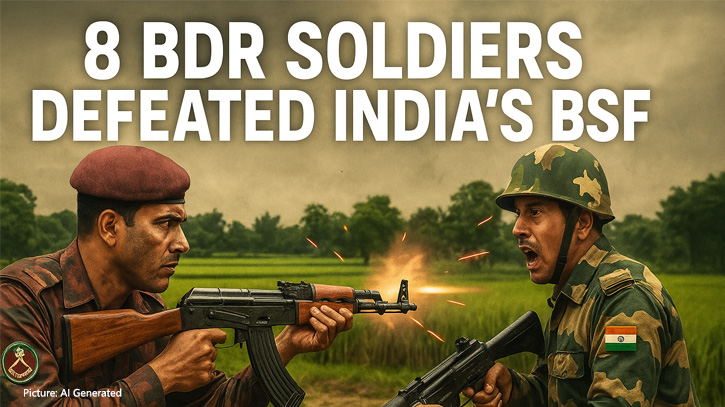India’s Border Security Force (BSF) suffered a humiliating defeat at the hands of just eight members of Bangladesh’s BDR (now BGB). Yet, despite their bravery, then-Prime Minister Sheikh Hasina removed the BDR Director General from his post. So, what exactly happened on April 18, 2001, at the Bangladesh-India border village of Boroibari?
Though the major battle occurred in Boroibari, the chain of events started at Padua in Sylhet. According to a BBC interview, then BDR Director General Major General (Retd.) Fazlur Rahman said that the BSF had been operating an illegal temporary camp inside Bangladeshi territory in Padua for a long time. Despite this, relations between the border forces of the two countries remained stable. In 2001, BSF began constructing a connecting road through Bangladesh’s border area to another of their nearby camps. In response, the BDR also established an operational camp in the same area.
Although BDR objected to the road construction, BSF ignored the protest and instead fired six rounds at the BDR’s operational camp. In retaliation, the BDR surrounded the BSF camp from all sides. As a result, 70 BSF members surrendered and returned to India.
According to reports, the BSF then began planning revenge for this humiliating incident and set their sights on capturing the BDR camp in Boroibari, Kurigram. On the early morning of April 18, 2001, local farmers were irrigating their fields when they saw several hundred Indian soldiers walking across the rice fields, heavily armed. Some of them, speaking in Hindi, asked the farmers about the BDR camp’s location. One of the farmers, Saiful Islam, cleverly gave them a false direction, and the BSF headed the wrong way.
Saiful Islam then rushed to the Boroibari BDR camp. At the time, only 8 BDR soldiers were stationed there. After receiving the alert, they quickly evacuated the villagers and took up hidden positions around the village, leaving the camp seemingly empty. Saiful Islam, who was trained by the Ansar force, also took up arms and joined the BDR soldiers in preparing for resistance.
Several locals later told the BBC that the BSF eventually returned from the wrong location and found the BDR camp. They immediately opened random fire on the seemingly abandoned camp. Thinking it had been deserted, they began to approach. At that moment, the 8 hidden BDR soldiers opened fire from all directions. The BSF, thinking they were surrounded, began to panic and fired blindly while retreating.
Though villagers had initially fled, from 5 AM onward, as the gunfire intensified, 12 more villagers trained by Ansar returned to support the BDR soldiers. The gunfight continued until midday on April 18. After a short break in the afternoon, it resumed in the evening. Once the message reached headquarters, more BDR troops were sent from Mymensingh and Jamalpur to Boroibari. The gun battle continued through April 18 and the entire night of April 19. Eventually, the BSF forces retreated.
In this battle, 2 BDR members were killed. Inside Bangladesh’s border, 16 BSF soldiers’ bodies were found in the rice fields. Locals claimed at least 170 BSF members were killed. While most of the bodies were taken back to India, 16 were left behind. Initially, the BSF refused to take them back during a flag meeting, but they were eventually returned.
India Today published a report on May 7, 2001, expressing strong outrage over the incident. Prime Minister Sheikh Hasina assured India that the matter would be investigated and promised that such incidents would not recur. A BBC report also raised a conspiracy theory suggesting that the event may have been orchestrated to undermine Sheikh Hasina’s government and strain Bangladesh-India relations. As a result, BDR Director General Major General (Retd.) Fazlur Rahman was removed from his post, transferred to the army, and later forced into retirement. In a 2012 BBC interview, Fazlur Rahman stated that the allegations against him were baseless.
Whatever the reason behind it, on April 18, 2001, due to the courage and intelligence of just eight BDR soldiers and some villagers, Bangladesh secured its only direct military victory against India. General Rahman told the BBC that he was responsible for protecting the border and had performed his duty uncompromisingly, ensuring the safety of lives and property.

